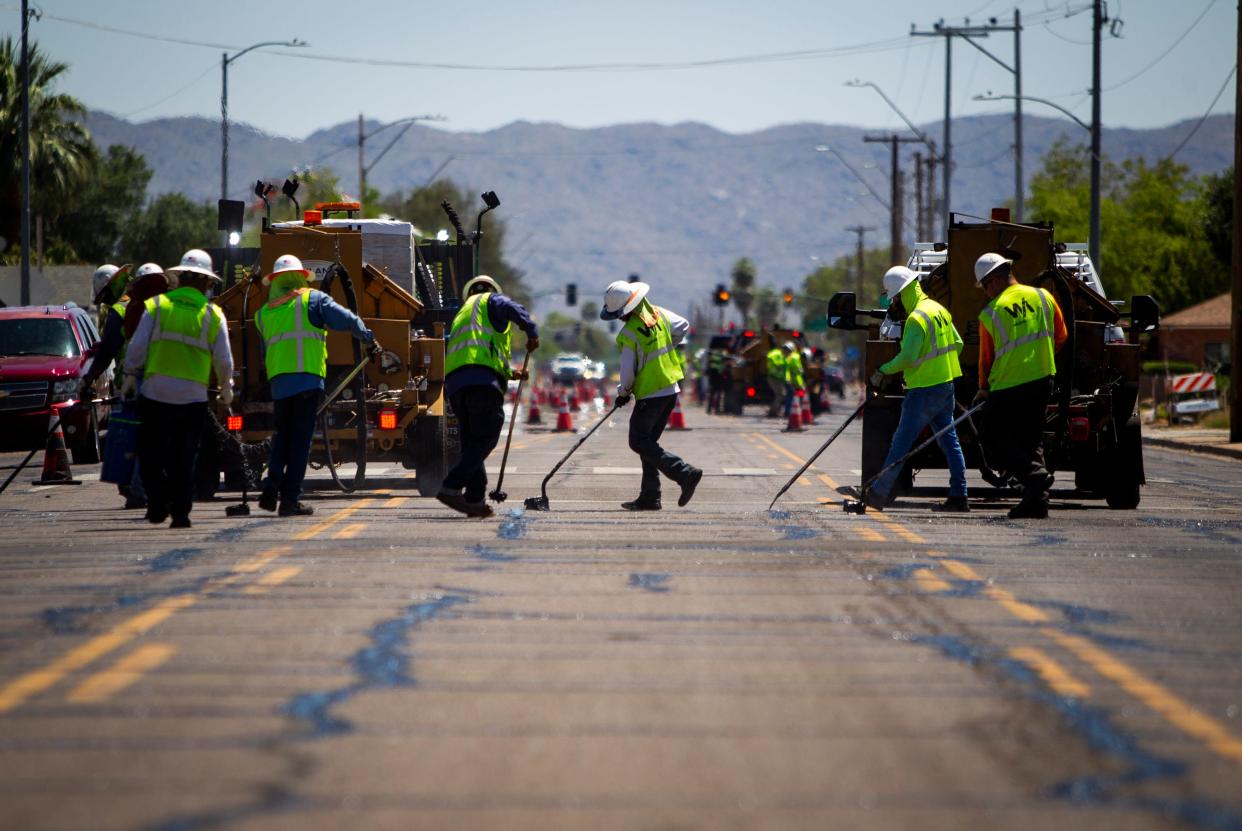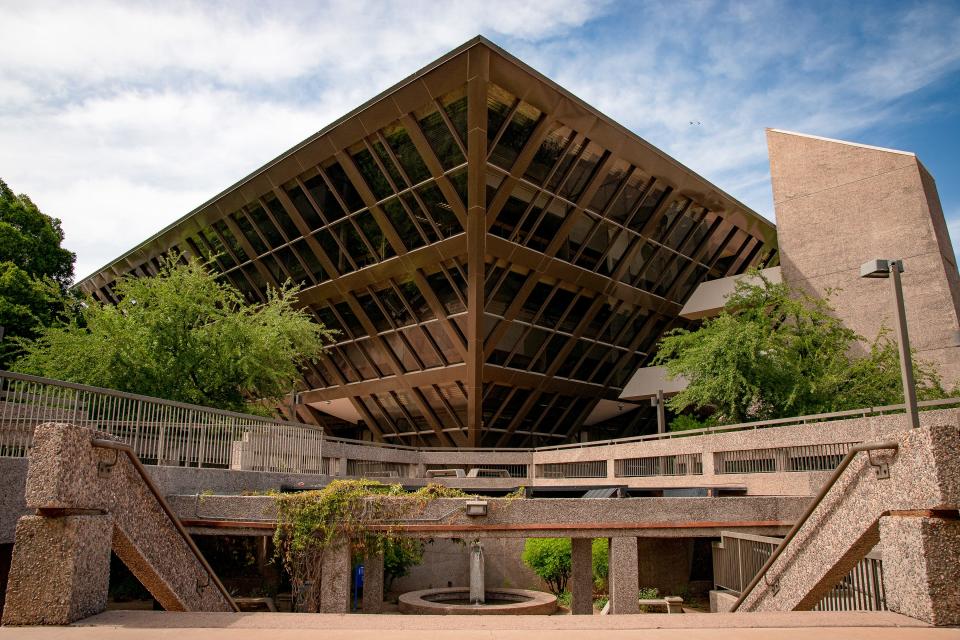Tempe wants to take on $582M debt to fix roads, update parks, add affordable housing

Tempe is asking its voters to approve more than $580 million in bonds to fund everything from affordable housing to Police Department upgrades to repairs on nearly every worn-down street in the city over the next four years.
City Council members unanimously decided April 25 to add the bond program to the Nov. 5 ballot. They want voters’ permission to take on $582 million in debt to fund capital improvement projects that fall into three categories:
$301 million for public safety and roadway improvements. This includes more than $100 million worth of roadway improvements, as well as fire, police, pedestrian infrastructure and storm drain projects, according to a city memo on the election.
$249 million for quality of life upgrades in Tempe neighborhoods. The city memo says this will provide “funding for parks, historic preservation, and municipal infrastructure projects.”
$32 million to increase the supply of affordable housing. At least a portion of this cash will go to Hometown for All, Mayor Corey Woods’ brainchild program that helps the city buy apartment complexes to ensure they remain affordable indefinitely.
If approved, it would be the city's single biggest bond package since Tempe Chief Financial Officer Tom Duensing took the role in 2019.
Duensing said voters shouldn't be intimidated by the dollar amount because of the city's growth and an increase in construction revenue that makes the capital improvement program fiscally reasonable.
"It is the biggest since I've been here," he said. "But Tempe has grown, (and we) have an obligation to take care of its infrastructure because of the growth ... Because we have significant increases in construction, we've got increases in our revenues. Therefore, we're able to take care of the things that we are obligated to take care of."
Tempe would pay back the bonds over two decades by raising residents’ secondary property taxes, which is how all Arizona cities repay bond debt. At some point over the next five years, the bond measure would begin to cost the typical Tempe household about $100 more per year than it's currently paying in property taxes.
The city hasn’t published a full list of what projects would be funded with the bond cash. Duensing said that list is expected to come out in early October, but that Tempe already knows what specific projects the bond money would help fund.

Tempe streets: What would the repair program look like?
The street improvement program is largely fleshed out, however. City Manager Rosa Inchausti has had that initiative on her priority list since her appointment in June 2023.
Road quality has been an issue in Tempe for years. The city uses a measure called the Pavement Quality Index to grade the condition of its more than 1,200 lane-miles of city streets on a scale from 0 to 100. Its goal has long been to reach a 70% score by 2028, which would put the city squarely in the "good" quality range.
But there’s been virtually no progress on that front over the past 12 years. Tempe’s road network has sat stagnant at about a 60% score during that time frame, which the city considers a “poor” quality score.
It costs roughly $1 million to pave just one mile of roadway, so Tempe just hasn’t had the cash on hand to get that score up to where it wants it to be.

Inchausti originally had planned to secure $180 million in bond funding when she spoke to The Arizona Republic in September. Her goal was to hit the 70% quality mark over four years with that money.
But the plan has since become both cheaper and more ambitious. Tempe now is asking voters to greenlight $135 million worth of debt for the effort — or 25% less than Inchausti’s initial estimates — and expects to reach an 82% pavement quality score within four years.
The city’s memo on the November election says the roadway funding “will be used to remove and replace pavement of all streets in poor condition and preserve existing surface streets in fair or good condition.”
Tempe Spokesperson Kris Baxter-Ging also said the sped-up street repair schedule also makes it "exponentially" cheaper for the city than it would be if it were spread out over years.
"Waiting is not as productive for our community as getting this done now," she aid. "We get our roads done faster for less money."
Duensing said, "If you repair something that needs repairs now, over the long run it's cheaper to maintain. That's an important point. It's an important benefit that we're going to get out of this."
Tempe's website states that maintaining a good quality road costs just $100,000 per lane mile every five years, while "deferred maintenance results in more expensive rehabilitation (at) $225,000 or reconstruction (at) $400,000 per lane per mile."
Tempe taxes, fees: What are the costs to residents?
Tempe already uses one-tenth of its yearly budget to pay back money that it has borrowed. And its secondary property tax rate, which generates cash to pay off that debt, is already the highest in the Valley by a significant margin.
But Duensing pointed out that residents of other cities, such as Scottsdale, are seeing big increases in costs of their other public services like water, which Tempe is not.
When all city fees are considered, Tempe is in the middle of the pack compared with other Valley communities. Tempe's $2,461 annual service cost after the potential $100 bump in property taxes would place it at least $300 above Gilbert and Chandler, but it would remain hundreds of dollars cheaper than Phoenix or Glendale.
“Other cities are experiencing significant pressure on their water and sewer rates, more so than Tempe. So, I would predict we'll probably stay in this exact order, if not get better, compared to other cities," Duensing said.
Tempe residents must register by Oct. 7 to vote in the Nov. 5 election.
Early voting ballots will be mailed out beginning Oct. 9.
Reporter Sam Kmack covers Tempe, Scottsdale and Chandler. Follow him on X @KmackSam or reach him at sam.kmack@arizonarepublic.com.
This article originally appeared on Arizona Republic: Tempe wants to take on $582M debt to fix roads, fund other initiatives

